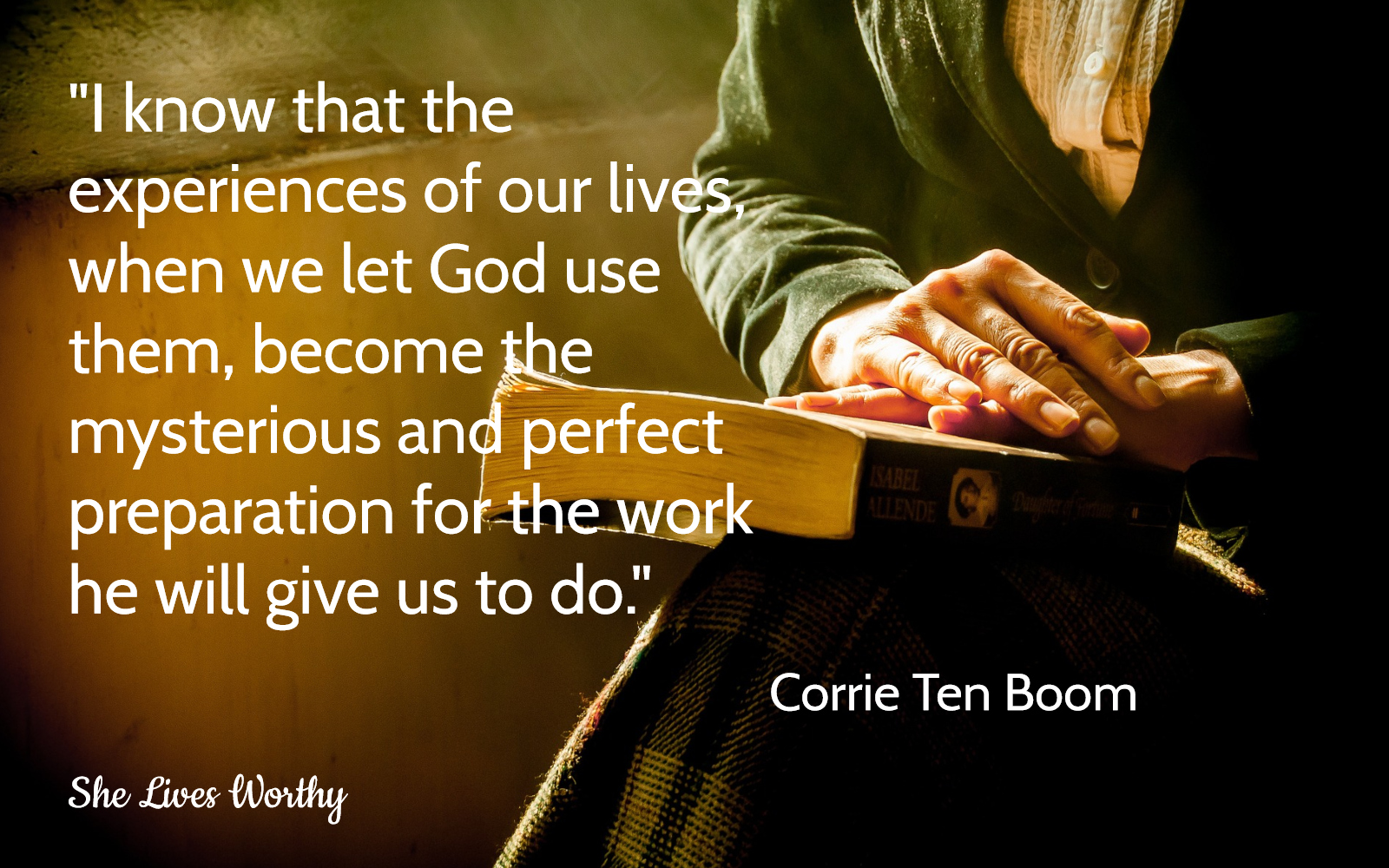I found that I have so much to say about Corrie Ten Boom that I’m going to do two posts. This post is about her life. The next one will discuss her legacy.
EARLY LIFE
People usually don’t set out to become heroes. They simply do what is required of them each step of the way. Such is the story of Corrie Ten Boom. I’m sure she never expected her life to take the turn that it did. She just did what she felt was right.
Born in 1892, Cornelia (Corrie) Ten Boom was the youngest of four children. She lived in a small house in Haarlem, Holland with her family, including her three aunts. Her mother was in poor health, but devoted her time to helping others. In 1918, Corrie’s mother had a stroke and was left mostly paralyzed. She died three years later.
“You can never learn that Christ is all you need, until Christ is all you have.”
Corrie Ten Boom
Corrie’s father was a watchmaker. Corrie kept the house, while her sister Betsie helped their father in his shop. However, when Betsie fell ill, Corrie began working in the shop. She enjoyed it so much that she went on to become the first licensed female watchmaker in Holland in 1922.
Corrie never married. The love of her life married someone else in order to please his family. Although she was devastated at first, Corrie was able to give her feelings to God, who helped her be content in her singleness. Little did she know at the time, God was freeing her for a greater purpose.
IMPRISONMENT
In 1940, the Germans invaded Holland. At first, there was little change in the lives of the Ten Boom family. However, the longer the invasion lasted, the harder things became as the restrictions against the citizens and the persecution of the Jews worsened. Corrie, her father, and her sister Betsie wanted to help their Jewish friends. Their first opportunity came in 1941 when the Nazis raided their neighbor’s shop. They hid the man in their home until their brother Willem, who was already part of the illegal underground group, could help him find a safe place to hide. Several months later, one by one, Jews began to show up at their door, seeking a hiding place.
Initially the Ten Booms would take the Jewish people in for a few nights until they could arrange transport to a safer location. Over time, their home became the headquarters of sorts for the underground. The many contacts Corrie’s father had made during his years as a watchmaker proved invaluable, as they were able to find people to help with all of their needs. They also ended up with seven Jews and resistance workers staying with them permanently. They had a secret room built to hide these people in case of a German raid, which finally came in February of 1944.
Corrie, her father, her brother, both her sisters, and numerous others were arrested in the raid on Corrie’s home. However, all except Corrie, Betsie, and their father were eventually released. The Jews hiding in their home made it into the safe room before the raid and were able to escape later. For Corrie, however, this was the beginning of a ten-month nightmare that would forever change her life.
“Happiness isn’t something that depends on our surroundings…it’s something we make inside ourselves.”
Corrie Ten Boom
Corrie and her family were first taken to a prison called Scheveningen. Corrie’s father died here only ten days after being arrested. After a few months, most of it spent in a solitary cell, Corrie was transferred to another prison called Vught. Here she was reunited with Betsie. Things were slightly better at Vught. Rather than being confined to a cell, they were able to work and have a little more freedom. Then, in September, the worst possible thing happened—they were transferred to Ravensbruck in Germany. Although conditions were terrible at all of the prisons, here they were unimaginable. The barracks were terribly overcrowded, there was little food, and they were forced to do hours of hard labor.
Betsie became very sick here, although she managed to remain positive, seeing their plight as an opportunity to minister to those around them, including their German guards. She was convinced that they would be released before the new year. She was right. Betsie was released to heaven December 16, 1944. Corrie was released from prison fifteen days later.
FREEDOM
Corrie returned to Haarlem, where she helped open a home for war victims to recuperate. Eventually, she even returned to Germany, where she helped turn a former concentration camp into a rehabilitation center. She traveled extensively, sharing her story with others. She told about the healing only found in Christ, and she encouraged forgiveness. She had the opportunity to put into practice what she was teaching others when she was approached by a German man who had been one of the guards at Ravensbruck. When he asked for forgiveness, she realized that on her own she couldn’t possibly forgive. However, God intervened and gave her not just forgiveness but Christian love for this man. After many years of faithful service, Corrie Ten Boom was called home April 15, 1983.
You can read about some of the lessons I learned from reading Corrie’s story in The Hiding Place by clicking here. There’s so much more to her story than I’m able to share here.






Tough Times Happen-What to Do When God Says NO - She Lives Worthy
[…] Corrie Ten Boom-Her Faithful Life (Part 1) […]
Amy Carmichael-Her Surrendered Life - She Lives Worthy
[…] Corrie Ten Boom-Her Faithful Life (part 1) […]